Disney’s Encanto has captivated audiences worldwide with its vibrant animation, catchy songs, and, most importantly, its deeply resonant story about family, identity, and healing. As a content creator for hudsonfamily.net, I’m fascinated by the intricate portrayal of the Madrigal Family and the psychological depth of each character. While I previously shared a review of Encanto, I wanted to delve deeper into the personalities of the Madrigal family members and explore the powerful messages about wellbeing, connection, and acceptance woven into their narratives. It’s hard to ignore the compelling themes of mental health that seem to permeate every aspect of this film, making each Madrigal’s story a poignant reflection of our own human experiences.
If you’ve watched Encanto and appreciated its surface charm, preparing to look closer reveals layers of meaning that are both insightful and profoundly moving. I’ve spent considerable time analyzing the film, and I believe there’s a rich tapestry of psychological themes waiting to be uncovered within the story of the Madrigal family.
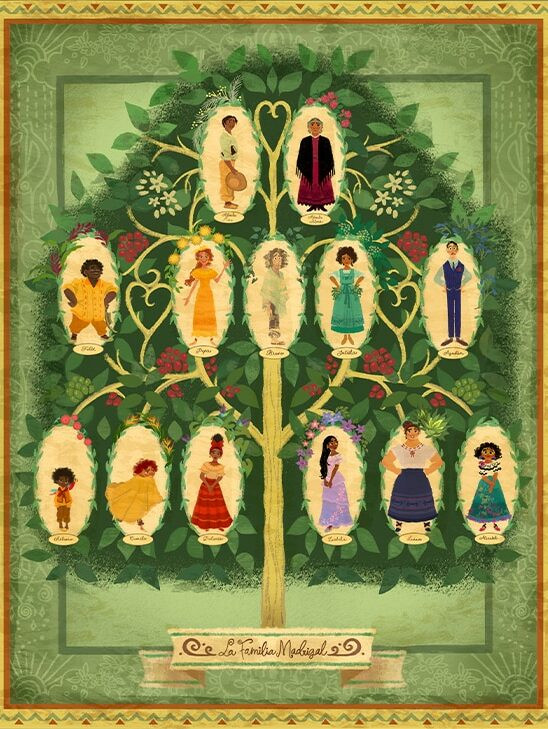 The Madrigal family posing in front of Casita
The Madrigal family posing in front of Casita
At the heart of Encanto is Mirabel Madrigal, a young woman who, unlike the rest of her family, was not blessed with a magical gift. However, as the story unfolds, it becomes clear that the magical gifts bestowed upon the Madrigal family members are often intertwined with significant personal burdens. These gifts, intended to serve and protect their community, sometimes become sources of pressure and internal conflict, revealing the complex dynamics within the Madrigal family.
NOTE: ***SPOILERS BEYOND THIS POINT***
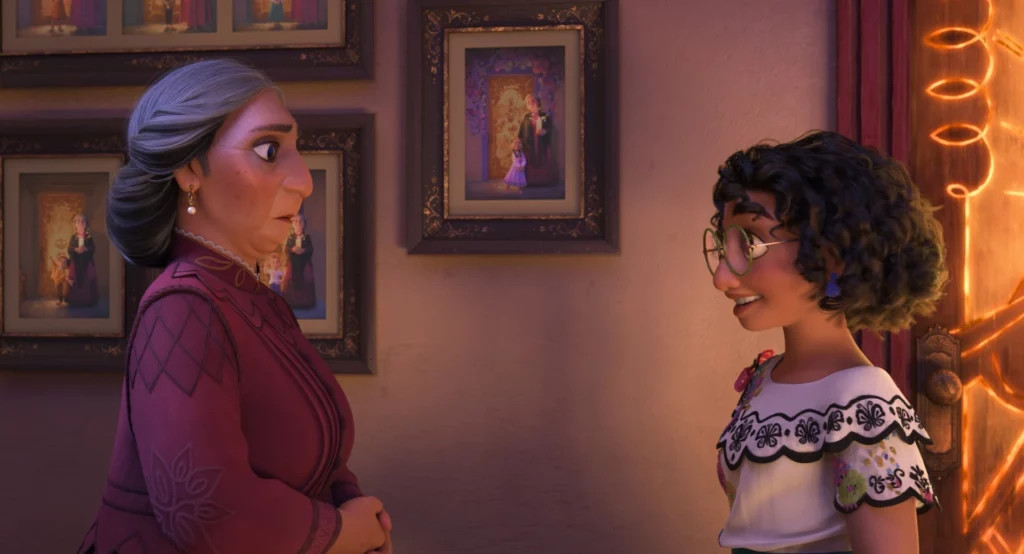 Promotional image of the Madrigal family from Encanto
Promotional image of the Madrigal family from Encanto
Abuela Alma: The Weight of Legacy and Generational Trauma
“Let’s be clear, Abuela runs this show.”
Abuela Alma, the matriarch of the Madrigal family, is the anchor of Encanto. Her story is rooted in profound sacrifice and loss. It was Abuela Alma’s strength and resilience that led her community to safety and brought the miracle to her family. However, this miracle was born from immense tragedy – the death of her husband, Abuelo Pedro, who sacrificed himself to protect her and their infant triplets. Witnessing this horrific event from the riverbank, holding her children, Alma’s grief became the catalyst for the magical Encanto, a sanctuary created as terrain shifted to shield her community in the Colombian mountains.
Over the years, the community grew to depend on the Madrigals and their gifts, and Abuela Alma carries the heavy weight of responsibility for both her family and the town. She instills this sense of duty in her family, proclaiming, “Our greatest honor is serving our beloved community” during gift ceremonies. However, beneath her composed exterior, Abuela harbors deep-seated fears. When Mirabel senses a threat to the magic, Abuela publicly reassures everyone while privately admitting, “if only our family knew how vulnerable we really are.”
Abuela Alma’s protectiveness of the miracle is understandable, born from her past trauma. Yet, this protectiveness morphs into a need for control, which ironically becomes the very force that weakens the magic and causes cracks in Casita, their magical home. The unresolved trauma from 50 years prior has become toxic, manifesting as generational trauma passed down to her children and grandchildren. We see this reflected in Mirabel’s desperate need for familial validation, and the intense pressure to be perfect and useful experienced by Isabela and Luisa. The struggles of each Madrigal family member can be traced back, in some way, to this foundational trauma.
The mountains that encircle Encanto, rising up around Abuela Alma’s sanctuary, can be interpreted as a powerful metaphor for her emotional walls, built to shield herself from further pain. It is Mirabel who ultimately has the strength to “move mountains,” confronting Abuela and helping her confront her past, breaking down these impenetrable barriers.
The Madrigal family name itself is also significant. Derived from the Latin word “matricale,” meaning “womb” or “river bed,” it encapsulates Abuela Alma as the family’s matriarch and the “womb” from which they grew, and Abuelo Pedro, whose sacrifice at the “riverbed” initiated the miracle. This thoughtful detail enriches the symbolism embedded within the Madrigal family narrative.
 A vibrant scene of the town of Encanto nestled in the mountains
A vibrant scene of the town of Encanto nestled in the mountains
Casita: More Than Just a House, a Reflection of Family Spirit
It’s fitting to explore Casita, the Madrigal family’s enchanted home. On the night of the miracle, Casita rose from the ground, becoming an integral part of the family and their gifts. Anthropomorphized, Casita is not just a dwelling; it’s a character in its own right, reflecting the family’s emotions and participating in their lives. Casita’s connection to Mirabel, the only Madrigal without a gift, is particularly intriguing.
Mirabel shares a unique bond with Casita, more profound than any other family member. Casita seems to recognize and reciprocate Mirabel’s empathy and spirit. When the miracle is threatened and Casita begins to crumble, family members attempt to save the candle, the source of their magic, but their gifts fail them. It is Mirabel, guided and aided by Casita, who succeeds in reaching the candle. In a poignant display of their connection, as the house collapses, Casita uses its last energy to protect Mirabel from falling debris.
After the original Casita is destroyed, the Madrigal family, with the support of the entire town, rebuilds it. When Mirabel opens the new door, Casita’s magic is restored. This powerful moment underscores that the spirit of a place isn’t solely in its structure, but in the people invested in it. Casita becomes a symbol of the family’s resilience and their interconnectedness, proving that home is truly where the heart is, especially for the Madrigal family.
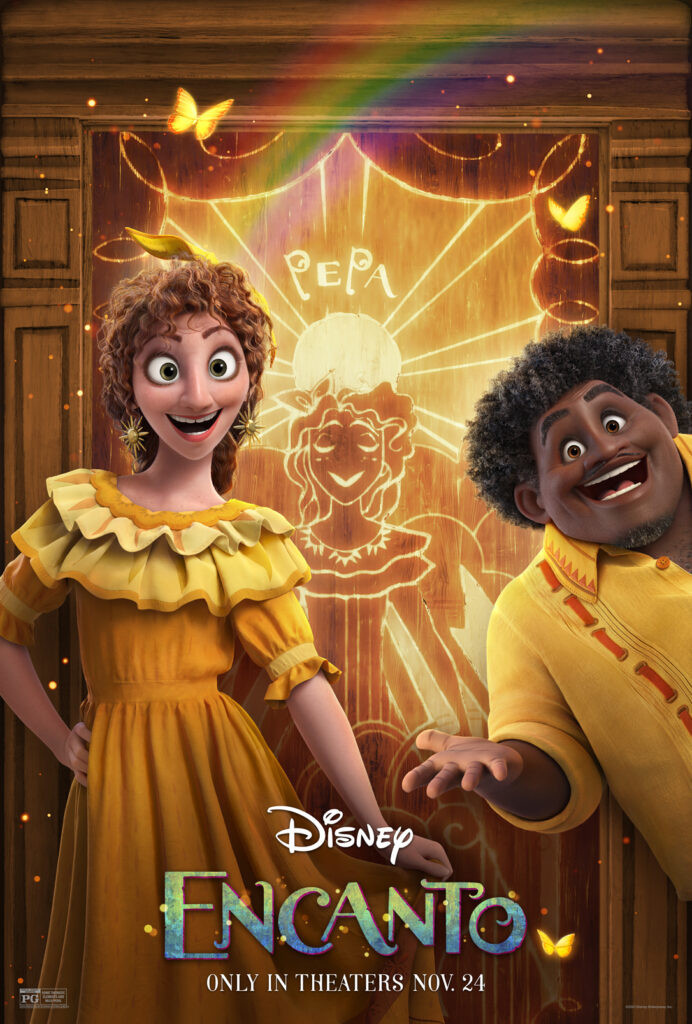 A promotional image featuring Isabela, Luisa, and Mirabel
A promotional image featuring Isabela, Luisa, and Mirabel
Tia Pepa (and Félix): Embracing Emotional Weather
Tia Pepa’s gift, the ability to control the weather with her emotions, is a vivid representation of emotional expression. Though rainbows occasionally appear, Pepa is often seen under her personal rain cloud. Described as “overly emotional,” Pepa’s displays of distress are often met with annoyance rather than compassion from her family. For anyone who has experienced mood disorders, the constant requests for Pepa to “calm down” resonate deeply.
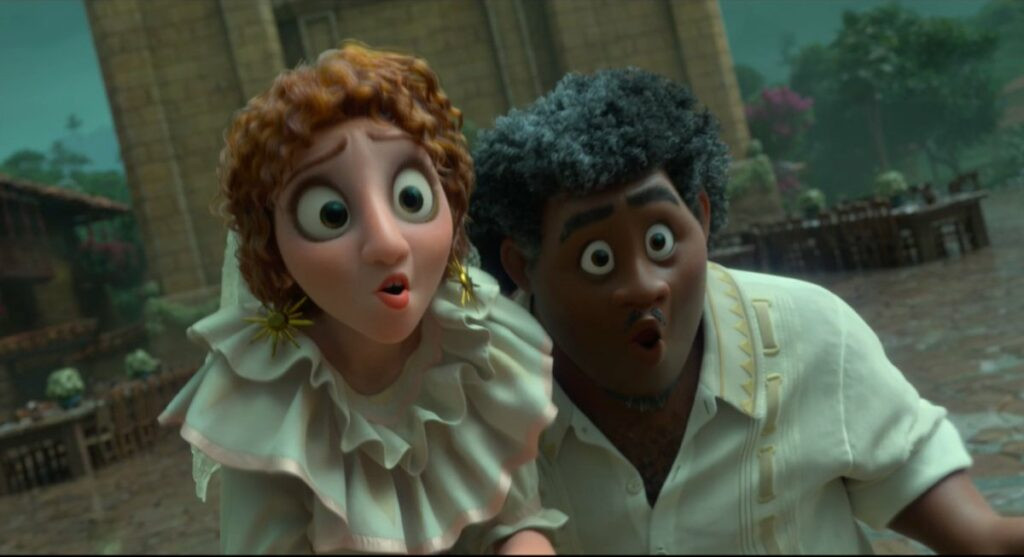 Tia Pepa with her ever-present rain cloud
Tia Pepa with her ever-present rain cloud
Félix, Pepa’s husband, is a beacon of acceptance. He embodies “unconditional positive regard,” a concept in psychology that emphasizes acceptance and support regardless of emotions or behaviors. Félix accepts Pepa’s moods without judgment, navigating family history with humor and always holding space for joy amidst challenges. He exemplifies the compassionate response Pepa needs, making their relationship a heartwarming example of support within the Madrigal family.
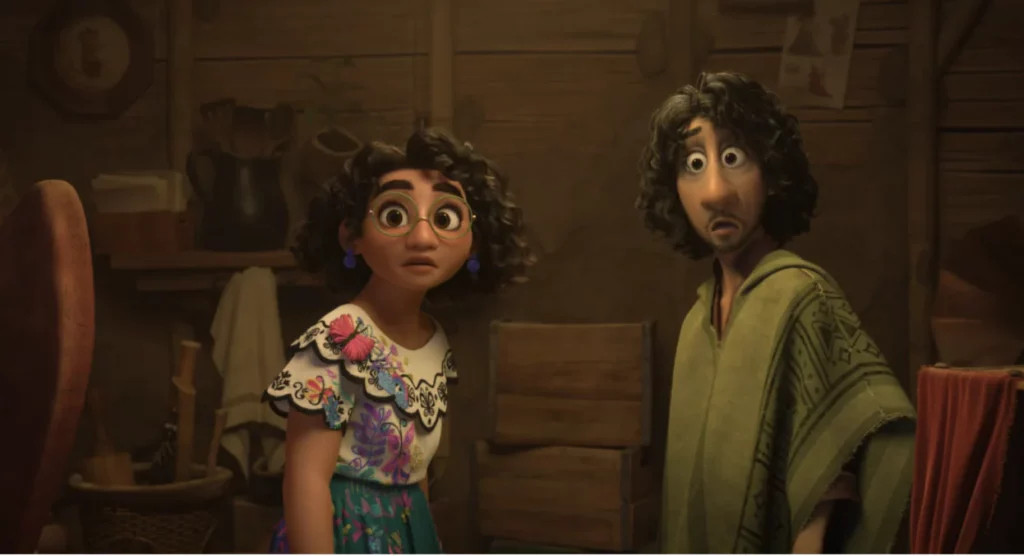 Félix comforting Tia Pepa under her rain cloud
Félix comforting Tia Pepa under her rain cloud
Tio Bruno: Prophecy, Misunderstanding, and Neurodiversity
Bruno, the prophetic uncle, is perhaps the most misunderstood member of the Madrigal family. His gift of seeing the future was consistently met with disappointment and blame. Bruno disappeared on the night of Mirabel’s gift ceremony, a sacrifice made to protect her and the family from his ominous visions. As the family’s “black sheep,” Bruno felt isolated and unappreciated. His family focused on his prophecies without seeing him as an individual. Despite feeling like a nuisance, Bruno’s intentions were always to protect his family, a commitment he continued by secretly living within the walls of Casita, patching up cracks to safeguard their home.
Bruno’s “eccentric tendencies” and superstitions are noteworthy. These traits could be interpreted as indicators of neurodiversity, adding another layer of depth to his character and highlighting the spectrum of personalities within the Madrigal family.
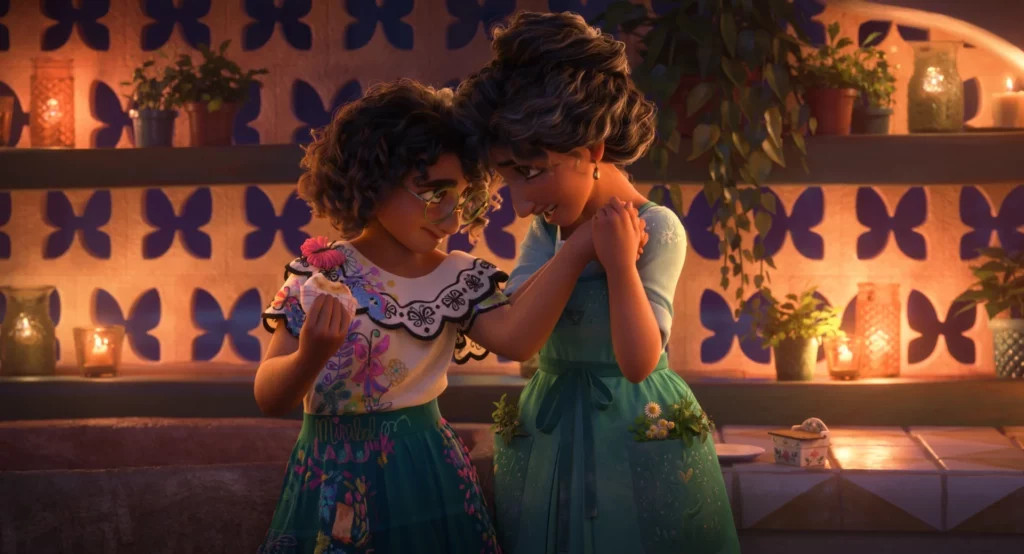 Tio Bruno hiding behind the walls of Casita
Tio Bruno hiding behind the walls of Casita
Julieta (and Agustín): Healing and Grounded Love
Julieta, Mirabel’s mother, possesses the gift of healing through her cooking. She consistently uses her gift to serve the community, mending injuries and ailments with her arepas. While her gift appears purely positive, it’s worth considering the potential burdens. The constant demand to heal others likely requires immense time and energy, suggesting a life dedicated to service. This selflessness might have influenced her daughters, Isabela, Luisa, and Mirabel, potentially contributing to patterns of prioritizing others’ needs above their own.
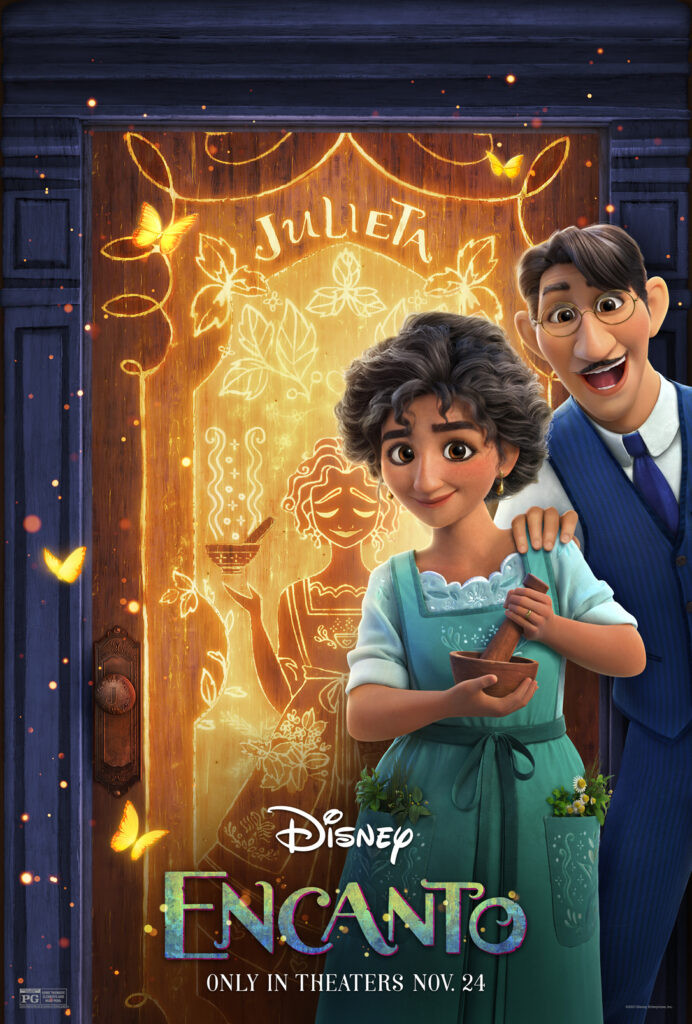 Julieta healing Agustín with an arepa
Julieta healing Agustín with an arepa
Agustín, Julieta’s husband, provides a grounded perspective within the magical Madrigal family. As an ordinary man married into this extraordinary family, he remains connected to the everyday world. His clumsiness often benefits from Julieta’s healing gift, and he offers unwavering support to his wife and daughters. It’s intriguing to consider whether Mirabel inherits her empathetic nature and resilience more from Julieta’s nurturing spirit or Agustín’s grounded perspective.
 Agustín looking lovingly at Julieta
Agustín looking lovingly at Julieta
Isabela: Perfection and the Pressure to Bloom
“Señorita Perfecta Isabela,” Mirabel’s eldest sister, is the epitome of grace and perfection in the eyes of the Madrigal family and the town. Her gift, the ability to grow beautiful flowers, reinforces this image of flawless beauty. Isabela lives under the immense pressure of maintaining this perfect facade, a classic example of “golden child syndrome.” The opening song even explicitly labels her the “perfect golden child.” Isabela conceals her true feelings and desires, obligated to embody everyone’s idealized image of her, a struggle relatable in today’s social media-driven world where curated perfection is often prioritized. Mirabel initially views Isabela as a selfish, entitled princess, unaware of the sacrifices her sister makes to uphold this image.
 Isabela in her perfect floral splendor
Isabela in her perfect floral splendor
When Isabela accidentally grows a cactus while expressing frustration, it’s a pivotal moment of self-discovery. She realizes her powers extend beyond conventional beauty, embracing a “growth mindset.” This cactus symbolizes her breaking free from imposed limitations and exploring her full potential. While Isabela begins a journey of self-discovery, her hesitation when confronted by Abuela reveals the deep-rooted influence of family expectations and the time it will take to truly break free.
More About Isabela
Diane Guerrero Reveals How She Relates To Encanto’s Isabela – Exclusive (looper.com)
 Isabela creating fantastical plants
Isabela creating fantastical plants
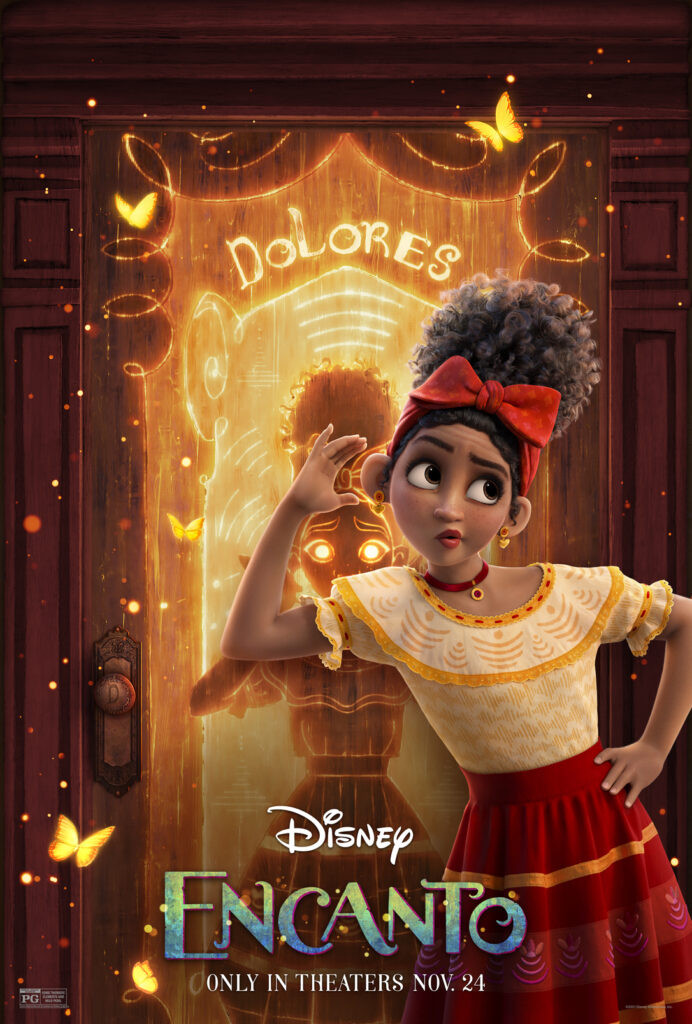 Isabela with her traditional perfect flowers
Isabela with her traditional perfect flowers
 Isabela embracing her imperfect, new growth
Isabela embracing her imperfect, new growth
Dolores: Hearing Secrets, Feeling Unheard
Dolores, the second oldest grandchild, often exists in Isabela’s shadow. Her gift of enhanced hearing allows her to know everyone’s secrets, but she often feels unheard herself. Dolores speaks softly, almost whispering, possibly due to her sensitivity to sound, but perhaps also reflecting a difficulty in asserting herself. She quietly observes and internalizes, even witnessing the man she loves propose to Isabela, highlighting her struggle to voice her own desires within the Madrigal family dynamics.
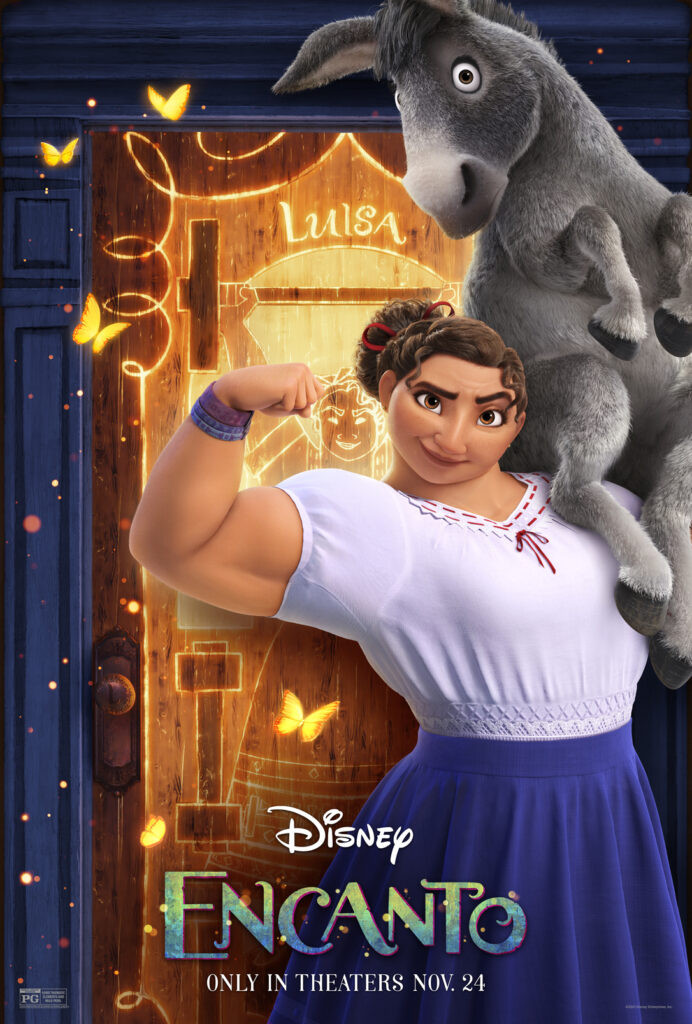 Dolores listening intently
Dolores listening intently
Luisa: Strength, Expectations, and Vulnerability
Luisa, Mirabel’s second oldest sister, possesses super strength. Initially appearing as the unbreakable rock of the family, Luisa reveals deep vulnerability. She bends under the constant demands of her family and the town, fulfilling endless requests – redirecting rivers, straightening houses, and moving buildings. Luisa feels the “crushing weight of expectations,” fearing failure and letting everyone down, a fear she may share or have inherited from Abuela. She attempts to set boundaries, but quickly reverts to her role as the strong one, equating her self-worth with her ability to serve. “I’m pretty sure I’m worthless if I can’t be of service,” she confesses to Mirabel.
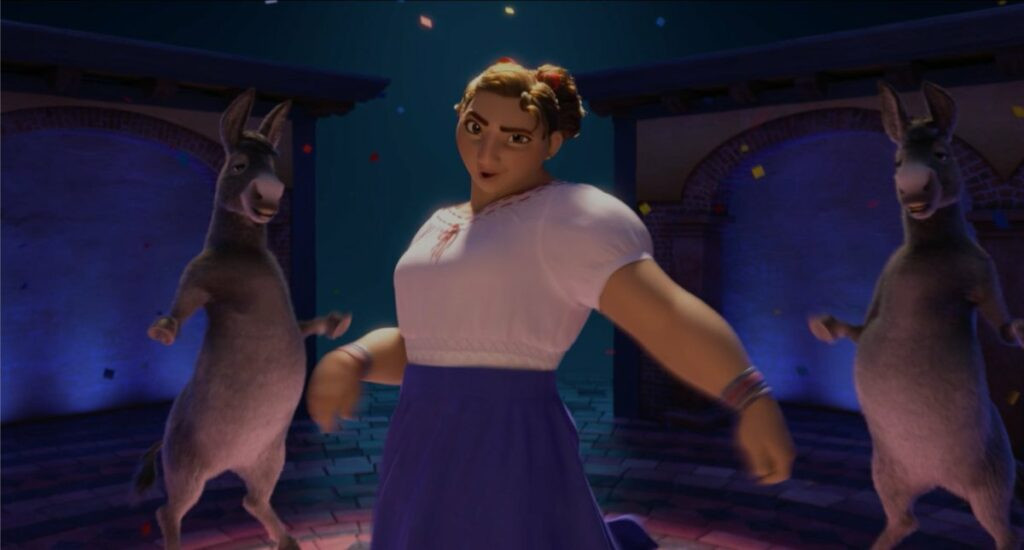 Luisa carrying the weight of expectations
Luisa carrying the weight of expectations
Luisa’s story serves as a crucial reminder to check in on those who appear strongest. Often, those who seem to have it all together are struggling in silence. Luisa’s internal struggles highlight the importance of looking beyond outward appearances and offering support to everyone, especially those who bear heavy burdens for the Madrigal family.
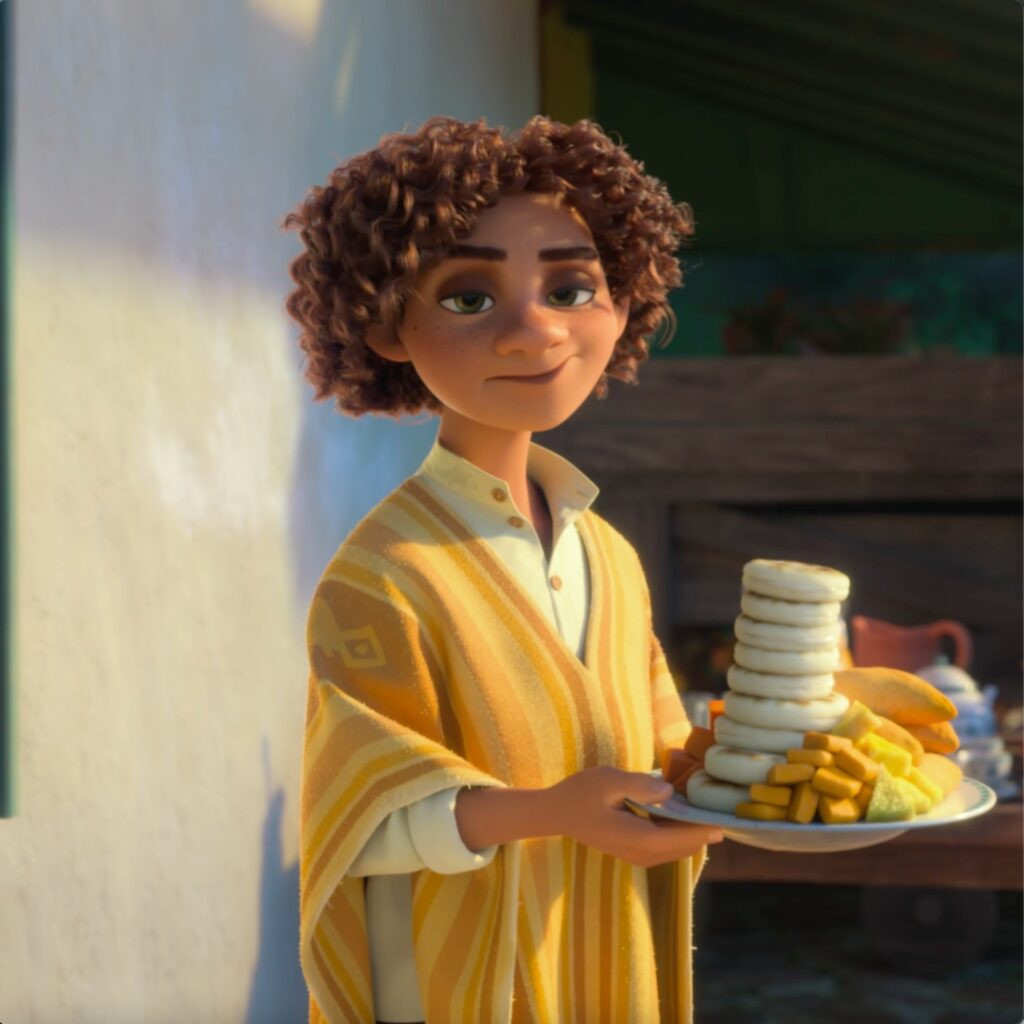 Luisa flexing her super strength
Luisa flexing her super strength
Camilo: Shapeshifting and Identity
Mirabel’s cousin Camilo, gifted with shapeshifting abilities, is playful and adaptable. He appears to be one of the few Madrigal family members accepted for who he is, regardless of appearance. However, Camilo’s shapeshifting gift might also hint at an underlying identity exploration or even an “identity crisis.” While Camilo plays a supporting role, his ability to change faces suggests a deeper narrative about self-discovery and the fluidity of identity within the Madrigal family.
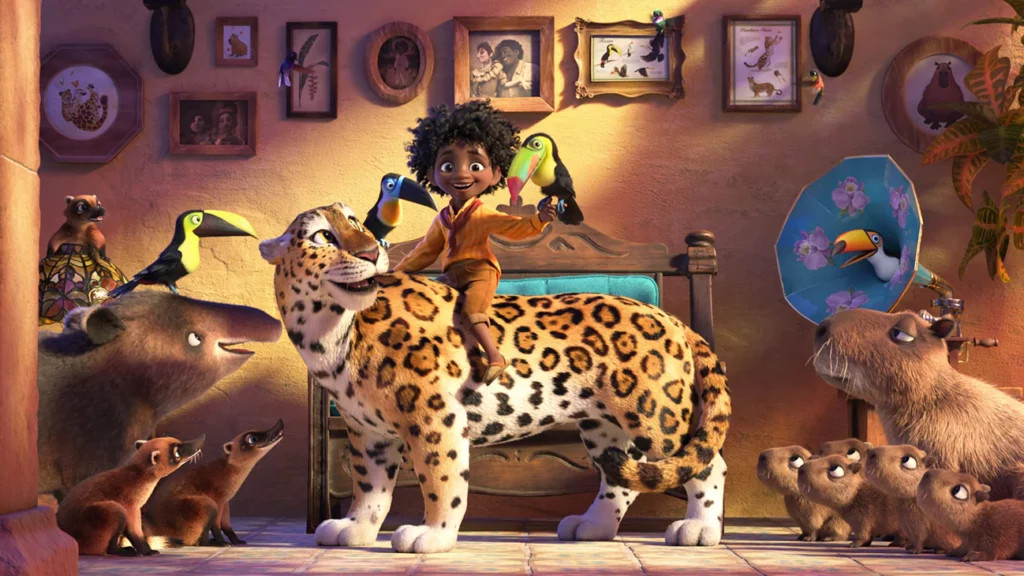 Camilo shapeshifting into different forms
Camilo shapeshifting into different forms
Antonio: New Gifts and Family Influence
Antonio, the youngest Madrigal, receives his gift of communicating with animals during the film. Even with his newfound gift, the pressure of family expectations is immediately apparent. One of Antonio’s first uses of his gift, asking coatis to warm Abuela’s seat, is perceived by Abuela not as a kind gesture, but as something that needs to be put “to good use.” This interaction reveals how the family, particularly Abuela, can shape Antonio’s understanding of his gift, mirroring Isabela’s experience. Instead of allowing children to explore their gifts naturally, external pressures can dictate how they perceive and use their abilities. Later, Antonio is nearly harmed by his own magical door as Casita crumbles, highlighting the potential dangers of the magic and the family’s interconnected fate.
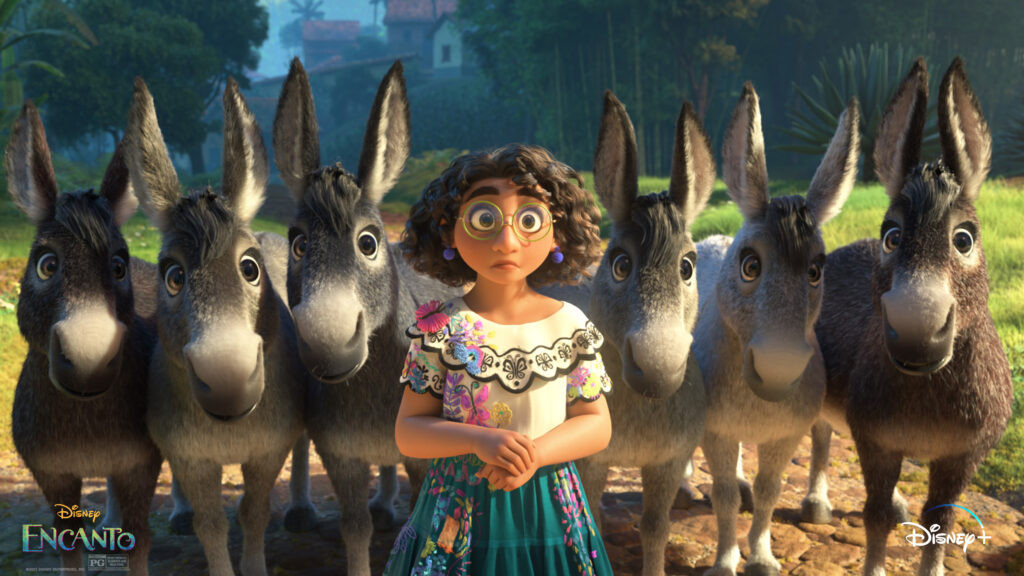 Antonio communicating with animals
Antonio communicating with animals
Mirabel: The Gift of Empathy and True Sight
Mirabel, the protagonist, is the only Madrigal child without a magical gift. However, she possesses extraordinary empathy and emotional intelligence. On the night she was meant to receive her gift, her door vanished, seemingly denying her a place within the magical lineage. Yet, this lack of a conventional gift becomes a metaphor for Mirabel’s true strength: her ability to break down emotional barriers within her family. The song “Dos Oruguitas” beautifully captures this, with the lyrics “wonders surround you, just let the walls come down.” Mirabel’s unique perspective allows her to see beyond the surface and recognize the individual struggles of each Madrigal family member.
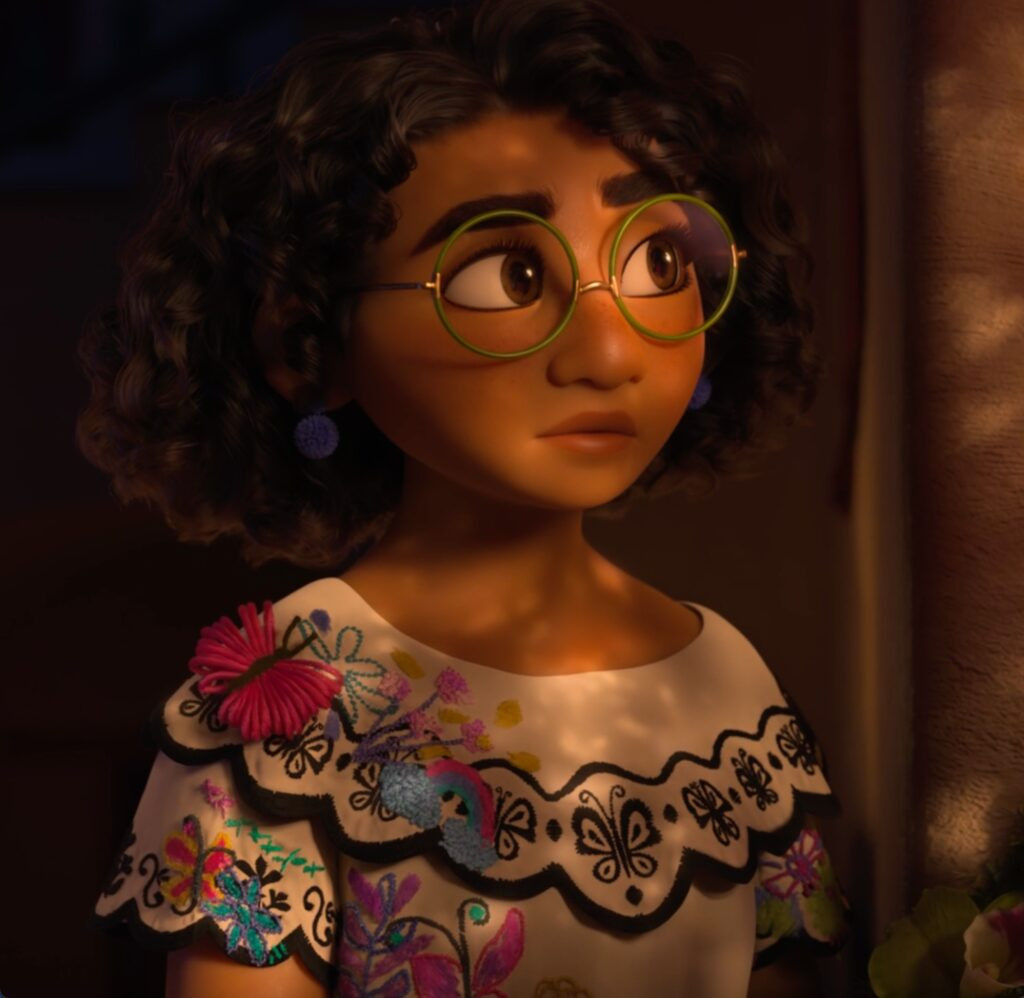 Mirabel looking determined and hopeful
Mirabel looking determined and hopeful
Mirabel’s name, meaning “wondrous,” is profoundly fitting. She is extraordinary in her own right, resilient despite a decade of being seen as “less than.” She affirms, “Gift or no gift, I’m just as special as the rest of my family.” Her mother calls her “Mira,” the Spanish word for “look,” and throughout the film, Mirabel yearns to be seen and understood. In “Waiting on a Miracle,” she pleads with Abuela to “open your eyes!” This young woman in green glasses, a symbol of her unique perspective, becomes the catalyst for her family’s healing. She sees her relatives for who they truly are, helping them see themselves beyond their gifts and burdens. In the film’s resolution, the Madrigal family reciprocates, encouraging Mirabel to look inward and realize that she herself is the true gift.
The Madrigal family’s journey in Encanto offers a powerful message: perhaps our world would be a little more magical if we all began to see each other with the same depth of understanding and acceptance that the Madrigals achieve by the film’s end. In the closing song, the family sings to Mirabel:
We see how bright you burn
We see how brave you’ve been
Now, see yourself in turn
You’re the real gift, kid, let us in.Open your eyes.
Abre los ojos.
What do you see?
To which Mirabel responds, finally seeing her own worth:
I see me.
All of me.
